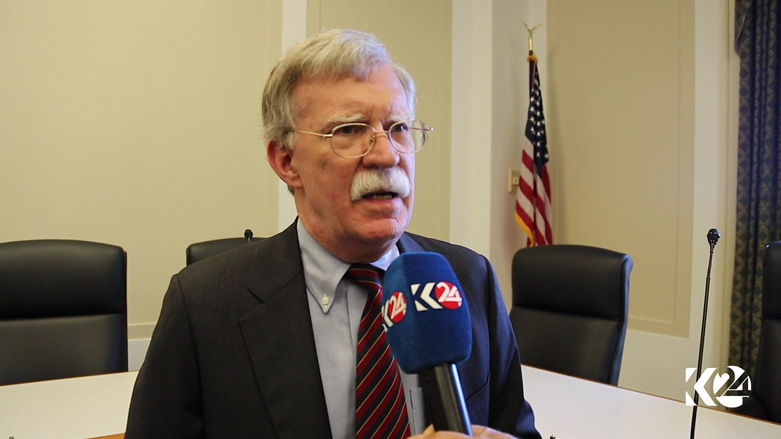Report: Bolton, Iran hawk, sympathetic to Kurds, influential in Trump administration

WASHINGTON DC (Kurdistan 24) – The New York Times reported Saturday that John Bolton, who was appointed White House National Security Advisor last month and who is very hawkish on Iran, “is emerging as an influential figure with a clear channel to the president and an ability to control the voices he hears.”
The Times suggested that President Donald Trump’s strong stand on Iran—abrogating the nuclear agreement and re-imposing tough sanctions—was an important indicator of Bolton’s standing.
Notably, Bolton has long sympathized with Kurdish political aspirations.
“I think the Kurdish people have been without a voice for far too long,” he told Kurdistan 24 shortly before last September’s independence referendum.
“If their decision is to seek independence for [the Kurdistan Region], I think the United States should recognize it,” he said.
And the day after Iraq’s attack on Kirkuk, Bolton criticized US inaction, characterizing the assault as “the Iran-dominated government in Baghdad, along with their regular forces and Shia militias, attacking our allies, the Kurds.”
“We were not paying attention,” although Qasim Soleimani, heads of the Quds Force of Iran’s Islamic Revolutionary Guard Corps,was in Kirkuk, “directing everything,” Bolton complained.
Bolton’s rising clout, as reported by one of America’s most prestigious papers, can only be good news for the Kurdish people—both in terms of Bolton’s sympathy for them and his tough stance against Iran.
In fact, the Times suggested that the real issue at hand is whether the Trump administration would pursue “regime change” in Iran or merely seek to change the regime’s behavior.
For over ten years, Bolton had advocated overthrowing Tehran’s theocratic government. However, on Friday, he said that was “not the objective of the administration.”
The Washington Free Beacon, a conservative news website, had reported the day before, on Thursday, that the White House was reviewing a plan to do just that.
The plan, a three-page paper, written by the Security Studies Group (SSG), a Washington think-tank with close ties to senior White House officials, including Bolton, is now circulating within the National Security Council. It “offers a strategy by which the Trump administration can actively work to assist an already aggravated Iranian public” topple the regime “through a democratization strategy,” the Beacon reported.
“More than one-third of Iran’s population is minority groups, many of whom already seek independence,” the SSG paper states.
That would include the Kurds of Iran, who number nearly seven million people.
“US support for these independence movements, both overt and covert, could force the regime to focus attention on them and limit its ability to conduct other malign activities,” the SSG paper suggests.
As Bolton’s influence has risen, the Times reported, that of Jim Mattis, Secretary of Defense, has fallen. Mattis has lost two close allies, former Secretary of State, Rex Tillerson, who was forced to resign in March, and outgoing National Security Adviser, H.R. McMaster, whom Bolton replaced.
Some individuals, frustrated by the extent to which the US has allowed Iranian influence to grow in Iraq, blame Mattis for not pushing back more vigorously.
They include the Hudson Institute’s Michael Pregent, an Iraq expert who worked under Mattis, when he was CENTCOM commander.
“I want ‘Mad Dog’ back,” Pregent said at a Hudson Institute seminar on Wednesday. Mattis was dubbed “Mad Dog” for his tough stance as a war-time commander. Indeed, as head of CENTCOM, he called Iran “the single most enduring threat to stability and peace in the Middle East.”
